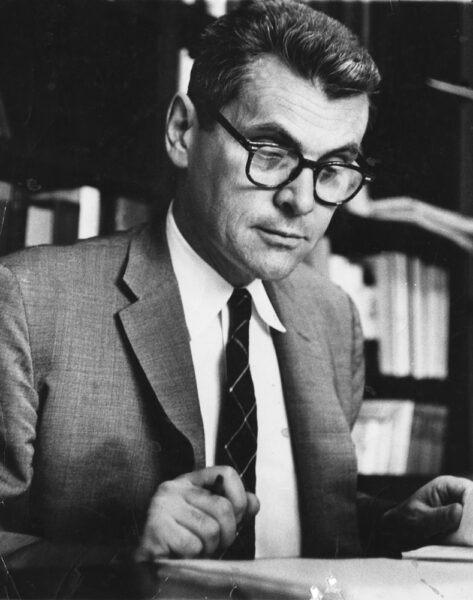
William H. McNeill. The Chicago Maroon
William H. McNeill, a former president of the AHA and a pioneer in the emergence of world history as a respectable academic field, died on July 8, 2016, at age 98. For 40 years (1947–87) McNeill taught at the University of Chicago, where he was appointed Robert A. Millikan Distinguished Service Professor. He wrote more than 20 books over the course of his career. He won a National Book Award, a National Humanities Medal, and the Erasmus Prize.
William McNeill was born in 1917 in Vancouver. His father, from a family of potato farmers on Prince Edward Island, became a Presbyterian minister and eventually a professor of church history. His mother, from the timberlands of Vancouver Island and the eldest of 10 children, headed east to attend university, an unusual path for a woman in British Columbia in 1908. The family moved from Vancouver to Toronto, and in 1927 to Chicago. For his 21st birthday, his parents gave him an Underwood typewriter along with a poem encouraging him to write a “book of worth.”
McNeill graduated in 1938 from the University of Chicago, where he served as editor of the student newspaper. That experience taught him to take clear positions and write fast. He stayed at Chicago to complete an MA, writing a thesis comparing Herodotus and Thucydides. In 1939, he moved to Cornell, where he encountered the work of Arnold Toynbee, who had recently published the first three volumes of A Study of History, which took seriously the history of places beyond Europe and North America—a revelation for McNeill. While reading Toynbee, McNeill conceived the ambition to write a general history of humankind.
The Second World War intervened. McNeill served in the US Army from 1941 to 1946, first in units of the coast artillery, and from early 1944 as an assistant military attaché to the Greek and Yugoslav governments in exile. That assignment, arranged by one of his Cornell professors, took him to Cairo and, a few days after the Germans left, Athens. Greece was then slipping into the ordeal of civil war. He met his wife, Elizabeth Darbishire, in Cairo (she always claimed) or in Athens (in his version of events) while she worked for the Office of War Information. Having grown up in Athens, she became his interpreter while he drove a jeep all over the country to report on Greek affairs for the army.
Soon after returning to civilian life, McNeill completed his PhD at Cornell with a thesis on the importance of the potato in Irish history, written mainly from the New York Public Library. He hoped to land a State Department position that would take him to China or the USSR, but when nothing came through, he settled on an academic career. He began at the University of Chicago in 1947 as an instructor in Western civilization classes. Over the next 40 years, he taught undergraduate classes and graduate seminars in European history and, from the 1960s on, an undergraduate survey of world history.
In the mid-20th century, world history stood in ill repute among professional historians. No one could write it on the basis of original sources in the original languages. Serious historians left it to journalists and polemicists. Almost no one taught it. McNeill chose to attempt both. For over 20 years he taught a yearlong introductory course that sought to make sense of the experience of humankind from the Paleolithic to the present. Between 1955 and 1963, he wrote the book that made his reputation, The Rise of the West. It owed something to Toynbee in that it took for granted the existence of multiple civilizations as suitable units of analysis. But he parted ways with Toynbee by emphasizing interactions among civilizations rather than their alleged parallel courses. He later modified his reliance on the model of “civilizations” but never wavered in his view that encounters with strangers provided the impetus for individuals, societies, cultures, and civilizations to change their ways, and therefore served as the motor of history.
The Rise of the West, written on the Underwood given him by his parents in 1938, won the National Book Award in 1964. In the 1960s, American schools and universities were beginning to experiment with world history classes, and McNeill’s work guided many instructors daunted by the assignment. He wrote a shorter textbook version, called A World History (1967), mainly while sitting in a camp chair beside a tent on Prince Edward Island.
In reading for The Rise of the West, McNeill had been struck by the accounts of smallpox’s ravages during the conquest of Mexico. Curiosity about that story led him to his second most influential book, Plagues and Peoples (1976), which assessed the role of disease in human history. It made the case that disease had pervasively affected demography and balances of power and in patterned, nonrandom ways. The advent of the AIDS crisis in the United States reminded many minds of human vulnerability to infection, helping the book to find a substantial audience.
McNeill regarded The Pursuit of Power (1982) as his third most important book. It surveyed the importance of military organization and technology for human societies since 1000 CE. Writing it convinced him that in his earlier work he had failed to appreciate the salience of Song China, especially its iron and steel complex. He often referred to both Plagues and Peoples and The Pursuit of Power as footnotes to The Rise of the West.
Along the way, McNeill wrote other books that did not purport to be world histories. America, Britain, and Russia (1952) was written under Toynbee’s loose direction at the Royal Institute of International Affairs in London and offered an early interpretation of the onset of the Cold War. The European Steppe Frontier (1964) tried to take insights from North American frontier history to the western steppe, contested by Russian, Ottoman, and Habsburg empires as well as many pastoral peoples. In Venice: The Hinge of Europe (1974), he argued that Venice’s importance lay in its role as intermediary between a Latin West and a Byzantine and Islamic East. He also wrote a biography of Toynbee, a study of the University of Chicago during the presidency of Robert Hutchins, and a rumination on the human physiology and psychology of synchronized movement and its role in forming community bonds, called Keeping Together in Time (1995).
McNeill was drawn to world history by reading Toynbee, but he was also suited to it by both his strengths and his weaknesses as a historian. He wrote easily and fluently, blending abstract principles with vivid examples. His ability to identify broad patterns, to assimilate information from all corners of history (and from epidemiology), allowed him to write persuasive, grand-scale histories. Yet he struggled with foreign languages and never tried to write anything that required a firm grasp of anything but English. His early work, especially The Rise of the West, includes ample citations to works in German and French, and in his Venice book, Italian-language references abound. But he read these languages with difficulty, and his rare efforts to speak them supplied his wife, who spoke them far better, with amusing tales. He never conducted archival research. That approach, although now routine among practitioners of world history in the United States, brought him criticism from specialists.
McNeill’s dedication to his work and to the University of Chicago had few equals. He felt that a day without writing for publication was a day wasted, and between the ages of 20 and 95, he did not “waste” many days. He chaired the history department at Chicago for six years in the 1960s and eagerly took part in debates on campus. He once tried to persuade the university to buy the Chicago Bears. But he carved out a few hours each week (or sometimes a few hours each month) for other pursuits. Into his 60s, he enjoyed tennis, even when he lost. He was a handy carpenter, plumber, and electrician, and once won a hammering contest at a county fair. After 1987, when he and his wife moved to the northwest corner of Connecticut, he became a keen gardener, raising everything from asparagus to zucchini. He took particular satisfaction in his potato crop, which he felt linked him to his Prince Edward Island ancestors, whom he regarded as assiduous and virtuous, and whose example he sought to transplant from the farm to the academy.
This work is licensed under a Creative Commons Attribution-NonCommercial-NoDerivatives 4.0 International License. Attribution must provide author name, article title, Perspectives on History, date of publication, and a link to this page. This license applies only to the article, not to text or images used here by permission.
